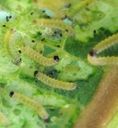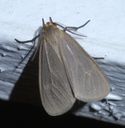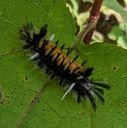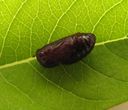Hodges#8238
Euchaetes egle
Classification
- Phylum: Arthropoda
- Subphylum: Hexapoda
- Class: Insecta
- Order: Lepidoptera
- Superfamily: Noctuoidea
- Family: Erebidae
- Subfamily: Arctiinae
- Tribe: Arctiini
- Subtribe: Phaegopterina
- Genus: Euchaetes
- Species: egle
Pronunciation
How to pronounce Euchaetes egle: /juːˈkeɪtiːz ˈɛɡli/
These audio files are automatically generated. While they are not always 100% accurate, they are a good starting point.
Images






Summary
Euchaetes egle, commonly known as the milkweed tiger moth or milkweed tussock caterpillar, is a moth first described by Dru Drury in 1773. It feeds on milkweeds and dogbane and has chemical defenses that deter predators.
Physical Characteristics
Wingspan 32-43 mm. Wings usually unmarked gray, abdomen yellow with black spots. Males use tymbal organs to produce ultrasonic clicks.
Identification Tips
Bright tufts of black, white, and orange setae on later instar caterpillars; adult wings are generally gray with a yellowish hairy abdomen with black spots.
Habitat
Fields, edges, etc. with host plants like milkweeds and dogbane.
Distribution
Eastern half of the US, plus Quebec and Ontario; found from southern Canada and south through Texas and Florida.
Diet
Larvae feed on milkweeds (Asclepias spp.) and dogbane (Apocynum spp.). Adults are common feeders on the same plants.
Life Cycle
One generation per year occurs in the north, and two or more may occur in the south. Life stages include egg, larva, pupa, and adult.
Reproduction
Females lay eggs in 'rafts' on the undersides of leaves. Caterpillars are gregarious during early instars and solitary in later instars.
Predators
Bats are deterred from feeding by the cardiac glycosides the moths acquire from their host plants; adults demonstrate unpalatability through ultrasonic clicks.
Ecosystem Role
As a herbivore, it may influence plant community dynamics, particularly in relation to milkweed populations.
Cultural Significance
The species name 'egle' may reference a character from a Lithuanian folk tale.
Evolution
Euchaetes egle is part of the family Erebidae and the tribe Arctiini. It retains chemical defenses from its host plants, a common trait in this family.
Tags
- Euchaetes egle
- Milkweed Tiger Moth
- Milkweed Tussock Caterpillar
- Arctiini
- Erebidae
- Lepidoptera